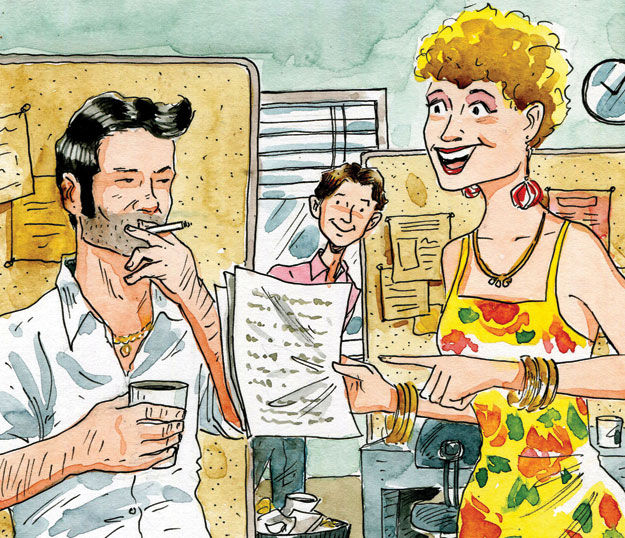Quirky Work

In college, I took an internship as a reporter and photographer for my small hometown newspaper. The job provided my first managing editor, a frontline supervisor who had to deal with my raw, uninformed work.
She was a smart, driven, jittery, nice young woman who might have been in her first newspaper job herself. She had short hair and wore long, dangly earrings that wobbled as she talked.
And she talked a lot. Stationed just feet from her cubicle, I sat at my desk each morning and listened as she kept up a stream of nervous, deadline-driven self-chatter, her noise competing with the tick-tack-tick of the newswire machine. Sometimes an odd wire story would grab her, and she’d let loose a giant “Ha!” or a burst of high laughter. Often she would rocket out of her seat and round her cubicle corner, waving some dispatch from afar, and then summarize a story that she found too incredible not to share.
“A guy in Wichita robbed a bank while wearing just a clown mask and his underwear!” she’d say. If none of us responded with matching glee, she’d repeat, “In his underwear!” and then cackle and disappear back into her work.
The newspaper employed one other reporter, an experienced journalist from the North who had drifted to North Carolina and ended up at this tiny paper, a career turn that left him bitter and resentful. He chain-smoked and wore long sideburns, and he kept his shirt unbuttoned enough to show off his necklaces. Driven by cynicism and mistrust, he was streetwise and wrote well, and, unlike me, he never showed up for work empty-handed.
Soon after I started the job, I saw him one morning in the managing editor’s cubicle, discussing a story he’d written, and their conversation degenerated into a venomous argument that ended with him skulking back to his desk, outranked and
overruled. That was only the first of many such caustic standoffs between them, evidence of mutual hatred that had metastasized in their bones. Perhaps she would have fired him, but the paper needed his talents. Perhaps he would have poisoned her coffee, but he needed not to be on death row. So she kept talking, and he kept seething.
I was just a kid. I’d never witnessed bona fide office hostility or unmasked loathing, so I negotiated a balance. With him, I talked photography and left it at that. With the managing editor, I kept quiet and tried to please her. She knew I didn’t have a clue about what I was doing, and she responded to my mediocre work with empathy and encouragement.
She seemed to appreciate having half her reporting staff not despise her. My stories and pictures got good play.
Eventually the other reporter left for another newspaper, and peace ensued. Free now from the long war, the managing editor kept me on part-time during my senior year. She never stopped complimenting my work or improving it for me.
She became a kind of mentor, quirk and all.
We didn’t work together long, and I don’t know what became of her. But she taught me an important workplace lesson: when there’s just the other guy and you, don’t be the other guy.
Tim Bass is coordinator of UNCW’s bachelor of fine arts program in creative writing.
To view more of illustrator Mark Weber’s work, go to www.markweberart.blogspot.com